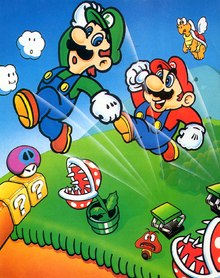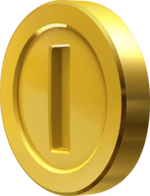Mushroom Kingdom
- This article is about the Mushroom Kingdom political entity. For the town in Super Mario RPG: Legend of the Seven Stars, see Toad Town § Super Mario RPG: Legend of the Seven Stars. For the kingdom as seen in Super Mario Odyssey, see Mushroom Kingdom (Super Mario Odyssey). For other uses, see Mushroom Kingdom (disambiguation).
The Mushroom Kingdom is the primary setting of the Mario franchise. It is ruled by Princess Peach, and its appearance changes from game to game. Despite this, the kingdom consists of many similar recurring landscapes, such as plains, deserts, islands, forests, mountains, snowy areas, and volcanoes.
Despite being mostly peaceful, the Mushroom Kingdom is often the victim of numerous catastrophes, which include multiple attempted takeovers (mostly at the hands of Bowser), awakenings of great evil, a few pandemics such as the Blorbs, ruining of several festivals and traditions, alien invasions, and even the near destruction of the kingdom itself. Nearly all of these disasters lead to Peach getting herself in danger, leaving Mario and Luigi, the kingdom's heroes, as the ones to save her. While Bowser is mainly focused on conquest, other villains may try to destroy the kingdom and its inhabitants, leading him to team up with the heroes at times.
Overview
In Super Mario Bros. and the New Super Mario Bros. games, the Mushroom Kingdom is often portrayed as having eight differently-themed worlds (usually grasslands, desert, snow, etc.) that Mario has to travel through in order to rescue Peach from Bowser. Super Mario RPG: Legend of the Seven Stars, in World 1, is the first appearance of civilian life in the Mushroom Kingdom, something continued later in games such as the Paper Mario and Mario & Luigi franchises. Mario Kart 64 and later Mario Kart games reveal that the Mushroom Kingdom has metropolitan areas in the forms of Toad's Turnpike, Mushroom City and other urban courses.
In The Super Mario Bros. Super Show!, the Mushroom Kingdom, most commonly referred to as "Mushroomland", is a central plot point in the show; the Mushroom Kingdom is apparently under the influence of King Koopa in the show. Mario, Luigi, Toad and Princess Toadstool spend the bulk of the series' episodes searching for someone or something that could free it from his grasp.
Leaping Lizards describes the Mushroom Kingdom as being deep under the surface of the Earth, which is used as an explanation for how Mario and Luigi can reach the Kingdom through a series of pipes in Brooklyn.[1]
The Mushroom Kingdom has inspired several stages in the Super Smash Bros. series. Two of these, both called Mushroom Kingdom, are based off of the kingdom as it appeared in the original Super Mario Bros., with usable Warp Pipes and POW Blocks in Super Smash Bros., and ? Blocks and Brick Blocks in Melee. Despite its name, Mushroom Kingdom II from Melee is based off of Subcon as it appeared in Super Mario Bros. 2. All three of these stages feature 3-D versions of stage elements, such as blocks and platforms, while any characters are portrayed as flat 2-D images.
In Super Smash Bros. Melee's Adventure Mode, the first stage is also called Mushroom Kingdom, where players have to get past Goombas, Koopa Troopas, and a team of Yoshis to reach Princess Peach's Castle, where Peach and either Mario or Luigi are fought. Two Toads also appear, one at the Yoshi arena and one at the endpoint.
Super Smash Bros. Brawl features Mushroomy Kingdom. This stage indicates that in the alternate world of Super Smash Bros., the Mushroom Kingdom was abandoned after Super Mario Bros. Familiar structures are now old, worn-down ruins and the entire stage appears as a barren desert and cave. The stage depicts replicated versions of either World 1-1 or World 1-2 when selected.
In Super Smash Bros. for Wii U, a stage called Mushroom Kingdom U, based on the worlds from New Super Mario Bros. U, is featured.
The Mushroom Kingdom appears as a mushroom-shaped island in Super Mario Odyssey, although smaller than its previous appearances.
General information
Government
The Mushroom Kingdom is an absolute monarchy ruled by Princess Peach. The kingdom's capital is Toad Town. Here, Princess Peach resides in her castle. Early material also includes her father, the kindly Mushroom King, who is mentioned to rule alongside her. However, he does not seem to perform any administrative functions, and his presence is largely forgotten in the series.
Princess Peach keeps a hoard of Toad guards at her castle. However, Mario, Luigi, and many other heroes of the Mushroom Kingdom have fought to save it and its princess countless times before. Currently, Princess Peach staffs and supports Toad Houses in major towns near Toad Town.
Demographics
The Mushroom Kingdom's population is very vast, consisting of hundreds of species. Most prevalent are Toads, Koopa Troopas, Goombas, Yoshis, and Boos. Aside from Princess Peach and the Mario Bros., there appears to be very few humans living in the Mushroom Kingdom.
Currency
- Main article: Coin
The Mushroom Kingdom mainly uses coins for tender, referred to as Mushroom Coins in the Beanbean Kingdom. Coins are often found scattered throughout the Kingdom. The coin has undergone several changes throughout the years; the three most prominent coin designs are the blank design, the star design and the "|" design.
Below is a table detailing the value of each type of coin.
| Type of Coin | Value |
|---|---|
| Gold Coin | 1 |
| Red Coin | 2 in Super Mario 64, Super Mario 64 DS and Mario Kart Tour, 1 in other games |
| Blue Coin | 5 in Super Mario 64, Super Mario 64 DS and Mario Kart Tour, 1 in other games |
| 10-Coin | 10 |
| 30-Coin | 30 |
| 50-Coin | 50 |
| Giant coin | 100 |
| Crown Coin | 1000 |
Cities, towns, and castles
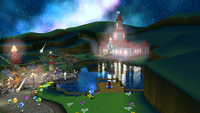

Overall
- Toad Town - The capital city of the Mushroom Kingdom
- Peach's Castle - The capital building of the Mushroom Kingdom
- Mario Bros.' House - Mario and Luigi's house
- Luigi's NEW Mansion - A mansion owned by Luigi
Super Mario RPG: Legend of the Seven Stars
- Mushroom Way - A northern road between Mario's Pad and Mushroom Castle.
- Bandit's Way - A southern road home to outlaw monsters.
Paper Mario series
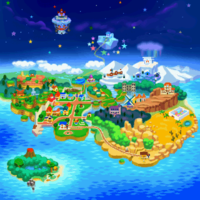
- Goomba Village - A small village populated by Goombario's family
- Koopa Village - A village of Koopa Troopas
- Koopa Bros. Fortress - The Koopa Bros. hideout
- Dry Dry Outpost - A small desert town home to Dryites
- Dry Dry Ruins - The ancient home of the Nomadimice
- Forever Forest - A spooky forest.
- Boo's Mansion - One of many ghost houses found in the world
- Gusty Gulch - The path to Tubba Blubba's Castle; includes a village home to Boos
- Tubba Blubba's Castle - A castle filled with Clubbas and their master, Tubba Blubba
- Lavalava Island - A volcanic island and its village full of Yoshis and Ravens
- Flower Fields- Flowers and fauna grow here; home to the Bub-ulbs
- Shiver City - A snowy city full of Bumpties
- Starborn Valley - Birthplace of the stars
- Crystal Palace - An intricate maze of mirrors and statues
- Decalburg - A town inhabited by Toads where the Sticker Fest is celebrated
- Surfshine Harbor - A harbor north of Decalburg
- Yoshi Sphinx - A Yoshi-shaped Sphinx in a desert near Decalburg
- The Enigmansion - A haunted mansion within a snowy area near Decalburg
Mario & Luigi series
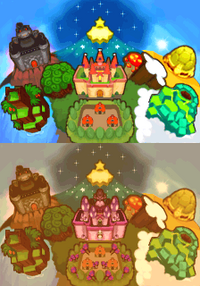
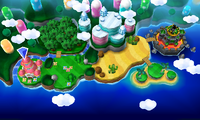
- Hollijolli Village - A jolly little Christmas-themed town the Shroobs invaded
- Toadwood Forest - A forest where Toads' vim is drained
- Vim Factory - A factory where Toads' vim is processed to fuel the Shroobs' machines
- Gritzy Desert - A desert with a hidden colosseum
- Koopaseum - A stadium hidden in the Gritzy Desert
- Gritzy Caves - The caves underneath the Gritzy Desert
- Thwomp Volcano - A now-dormant volcano where Thwomps live
- Thwomp Caverns - The inside of Thwomp Volcano
- Star Hill - A star-filled mountain
- Star Shrine - A shrine at the top of Star Hill
- Dimble Woods - A forest filled with many Wigglers and Treevils
- Cavi Cape - A cape near Plack Beach and Blubble Lake
- Plack Beach - A beach south of Bowser's Castle
- Bumpsy Plains - A grassy plains area near Bowser Path
- Bowser Path - A path that leads to Bowser's Castle
- Toad Town Caves - A sewer system underneath Toad Town that held the Dark Star
- Tunnel - A tunnel underneath Cavi Cape
- Toad Town Mall - A mall on the south side of Toad Town
- Project K - A railroad connecting Toad Town Caves, the Tunnel, and Bowser's Castle
- Blubble Lake - A lake with many Crawfuls and Beehosses
- Tower of Yikk - A tower designed and inhabited by the late Yikk
- Sunbeam Plains - A large grassy field neighboring Peach's Castle and Doop Doop Dunes
- Doop Doop Dunes - A desert with a bridge leading to Bowser's Castle
- Doop Doop Dunes Grotto - A cave underneath Doop Doop Dunes
- Twinsy Tropics - A tropical island near Bowser's Castle
- Twinsy Tropics Dungeon - A prison and mine under Twinsy Tropics
- Gloomy Woods - A forest with a haunted east half
- Mount Brrr - A frigid mountain where Bowser's villa is located
Mario Kart series
- Mushroom City - A giant city with many buildings
- Mushroom Bridge - A bridge near Mushroom City
- Moonview Highway - A highway in Mushroom City
Appearances
Names in other languages
| Language | Name | Meaning | Notes |
|---|---|---|---|
| Chinese (simplified) | 蘑菇王国[?] Mógu Wángguó |
Mushroom Kingdom | |
| Chinese (traditional) | 蘑菇王國[?] Mógu Wángguó |
Mushroom Kingdom | |
| Dutch | Paddenstoelenrijk[?] | Mushroom Realm | |
| German | Pilz-Königreich Königreich der Schwammerl (early translations) Schwammerlland (early) Pilze-Wunderland (animated series)[?] |
Mushroom Kingdom Kingdom of Mushrooms (Schwammerl (mushroom) is a dialectal word in Bavarian German) Mushroom Land Mushroom-Wonderland |
|
| Italian | Regno dei Funghi[?] | Kingdom of Mushrooms | |
| Korean | 버섯 왕국[?] Beoseot Wangguk |
Mushroom Kingdom | |
| Polish | Grzybowe Królestwo / Królestwo Grzybów[?] | Mushroom Kingdom / Kingdom of Mushrooms | |
| Portuguese | Reino Cogumelo Reino do Cogumelo (New Super Mario Bros. 2) Reino dos Cogumelos (animated series)[?] |
Mushroom Kingdom Mushroom Kingdom Kingdom of Mushrooms |
|
| Romanian | Regatul Ciupercă / Regatul Ciupercilor (The Adventures of Super Mario Bros. 3)[?] | Mushroom Kingdom / Kingdom of Mushrooms | |
| Russian | Грибное королевство[?] Gribnoye korolevstvo |
Mushroom Kingdom | |
| Spanish (NOA) | Reino Champiñón (games) Reino de los hongos (animated series)[?] |
Mushroom Kingdom Fungi Kingdom |
|
| Spanish (NOE) | Reino Champiñón (games and re-dub of The Adventures of Super Mario Bros. 3) Reino/País de las setas (animated series)[?] |
Mushroom Kingdom Mushroom Kingdom/Country |
|
| Swedish | Svampriket[?] | The Mushroom Kingdom |
Trivia
- In Nintendo Monopoly, there is a ? Block card that reads: "Save the Mushroom Kingdom. Advance to Mario."
References
- ^ "'Look out below!' Luigi yells. He dives head first into the Central Pipe that sticks up from the floor of the Mario Bros. plumbing workshop. Tumbling through steamy darkness, he passes dripping faucets, hissing valves and the glowing red eyes of wayward alligators. In minutes, he plunges from the Brooklyn plumbing shop to the Mushroom Kingdom, deep below the surface of the Earth." - Leaping Lizards (Clyde Bosco). Page 1.
- Kingdoms
- Hubs
- Dance Dance Revolution: Mario Mix Places
- Mario & Luigi: Paper Jam Places
- Mario Kart: Double Dash!!
- Mario Kart Wii
- Mario Superstar Baseball
- Super Mario Galaxy Places
- Super Mario Galaxy 2 Places
- Super Mario RPG: Legend of the Seven Stars Worlds
- Super Smash Bros. Melee
- The Adventures of Super Mario Bros. 3 Places
- The Super Mario Bros. Super Show! Places
- Unjust Desserts
